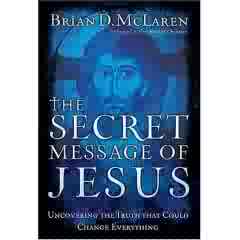 I recently finished is Brian McLaren's most recent book, The Secret Message of Jesus (Word Publishing Group, 2006). Many evangelicals are familiar with McLaren, the prolific and at times controversial author, who is also an influential figure in the North American emerging church movement. After reading the book I pass along my initial reflections.
I recently finished is Brian McLaren's most recent book, The Secret Message of Jesus (Word Publishing Group, 2006). Many evangelicals are familiar with McLaren, the prolific and at times controversial author, who is also an influential figure in the North American emerging church movement. After reading the book I pass along my initial reflections.Whether by accident or design, this volume was released at a time that coincided with the media hype surrounding the release of The Da Vinci Code film. The provocative title and thesis promise to connect with a post-Christendom audience that hungers for alternative and provocative twists on the Jesus story.
McLaren acknowledges a number of scholars and theologians who have been influential in this thought, particularly that reflected in this volume, with the influence of N. T. Wright standing out most significantly in the author's thinking about a "secret message of Jesus." McLaren clearly points out that he is not articulating a neo-Gnostic Jesus, nor a Jesus of various exotic alternative spiritualities, but instead, a Jesus that even traditional Christians might have misunderstood. McLaren wonders whether there might be something fresh and revolutionary in our understanding of Jesus, something hidden, almost secret, even to evangelicals who are casually dismissed by increasing numbers of people with the skepticism that is attached to "organized religion."
There is much to appreciate in this book. McLaren has an entertaining writing style that engages the reader. While some have complained that he raises more questions than he provides answers, I find this approach engaging in that it encourages reflective thought on the part of the reader rather than spoon feeding of the author's ideas. In addition, it is apparent that McLaren has found a fresh understanding of Jesus through interaction with first century Second Temple Judaism. This understanding can be liberating and invigorating to those who have encountered traditional representations found in various expressions of Christianity in America.
In addition to many positives, there is room for appropriate criticism as well.
First, I wondered who the intended audience was that McLaren had in mind. In the Introduction he writes, "I'm especially hopeful that this book will be helpful to people who consider themselves spiritual but not religious, or interested in Jesus but not Christianity" (xii). I appreciate McLaren's desire to write a book that seeks not only to provide a fresh voice to those in the church, but also to move beyond preaching to the choir to engage a post-Christian, post-modern culture. This book takes a few helpful steps in this direction in painting an alternative portrait of Jesus that moves beyond traditional Christian representations and vocabularly, but McLaren has a way to go in the process of contextualization. McLaren rightly presents Jesus' kingdom message as part of the broader biblical narrative, yet he does so in language and concepts that still resonate more to those with Christian sympathies than to the ear of the post-modern. I am sympathetic to McLaren's shortfallings here: The task of contextualization is a difficult one in cross-cultural communication. Increased engagement with the missions community and reflection on cross-cultural missiology will likely provide McLaren with additional tools to improve upon similar efforts in the future.
Second, McLaren includes a helpful endnote in chapter 1 that refers to "productive and needed interreligious reflection," that includes citations of the Dalai Lama's The Good Heart (Wisdom, 1998) and Thich Nhat Hahn's Living Buddha, Living Christ (Riverhead, 1997). With the religious pluralism of the West, and the increasing popularly of various forms of Buddhism and other religions and spiritualities, it would have been helpful had McLaren made interreligious reflection an essential part of this book's discussion as the author applied the ramifications of the secret message of Jesus to various faiths in America's neighborhoods.
Third, related to the above, McLaren states that he's "not talking about something silly....I don't want to insult anybody, so I won't mention anything specific, but you know what I mean: I'm not talking about Jesus being in league with aliens from the planet Zorcon-3 or anything like that" (xii). I appreciate McLaren's desires for legitimacy with a provocative thesis, but in our post-modern environment many times it is the Christian story of an incarnating and resurrecting God that attacts reactions of incredulity, not the so-called alternative spiritualities that evangelicals dismiss as "silly." We live and minister in a different cultural environment than in the past, and we might remember that in a post-modern, post-Christian environment with many looking at Christianity as "been there, done that," Christianity may be no more credible than aliens from Zorcon-3.
Fourth, McLaren references missiologist Lamin Sanneh, but it would have been nice to see the author interact with the insights of cross-cultural missiology, both in a holistic theology of Jesus and his message (incorporating the wisdom of the West and Majority World), and how the missio Dei plays a central part in that Kingdom message.
I enjoyed this latest effort by McLaren and hope that he continues his journey, while inviting readers to participate in this journey with him. Perhaps evangelicals involved in missiology, religious studies, and cultural studies can walk the path with McLaren and through dialogue along the way we can improve on both our understanding of Jesus and in the ways in which we share his message in the West.
No comments:
Post a Comment